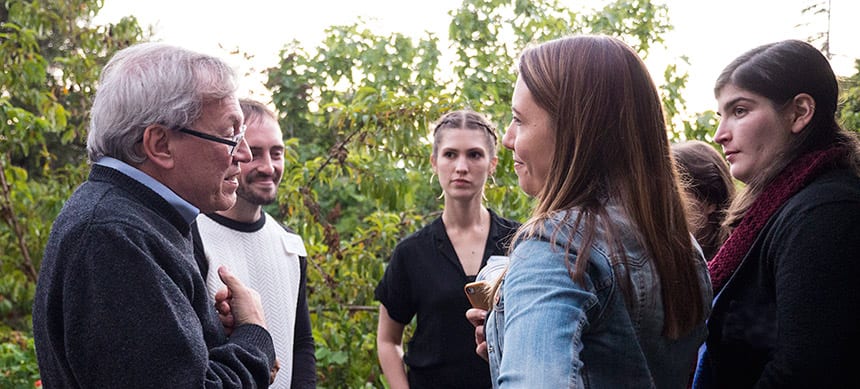
By Andrew Cohen
Erwin Chemerinsky officially became Berkeley Law’s dean on July 1. But for many, the true signal of this new era emerged during a dizzying week in August when Chemerinsky and his wife, Professor Catherine Fisk ’86, hosted eight parties for members of the school community at their Oakland home.
That level of engagement and warmth, hallmarks of Chemerinsky’s hugely successful tenure launching UC Irvine School of Law, resonated powerfully with students, faculty, staff, and alumni. They have also felt the winds of upward flight since his arrival.
While Berkeley Law has faced recent challenges, including an unexpected leadership change in March 2016, they are fading quickly in the rear-view mirror. The new era features major faculty additions; upticks in applications, budget expenditures, incoming students’ LSAT scores, and fundraising; needle-moving scholarship; flourishing intellectual property and business law programs; and expanding opportunities for hands-on public interest work.
“There are many reasons why this is one of the nation’s premier law schools and its top public law school,” Chemerinsky said. “We will sustain that momentum by continuing to invest in our teaching, research, and service mission.”
Fueling the faculty
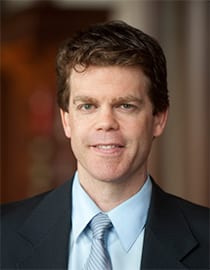
Fueling Chemerinsky’s excitement is the hiring of six new faculty members, including business law professors Adam Badawi ’03 and Frank Partnoy.
Badawi, a corporate finance authority and associate editor of the International Review of Law and Economics, focuses his research on shareholder litigation and the interplay between debt contracts and corporate governance.
Partnoy, a best-selling author and leading scholar on corporate governance and fraud, has testified on credit rating agencies before Congress and some of his proposals were included in the 2010 Dodd-Frank Act.
“Berkeley is an amazing place in every way,” said Partnoy, who will arrive next year. “Very few law schools offer the sheer number of business courses or substantive opportunities to interface with the business community. The business law group is energetic, accomplished, and running on all cylinders.”
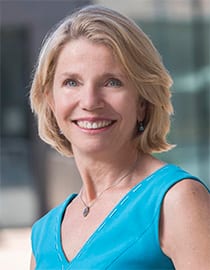
Adding to the roster of experienced faculty is Fisk, a labor law expert and workers’ rights advocate who has written five books and many articles on topics such as police unions, class action employment claims, and labor protests.
Two sought-after junior scholars, Abbye Atkinson and Joy Milligan, also joined the faculty this year. A recent Stanford Law fellow and lecturer focused on consumer law and finance, Atkinson was a research and teaching assistant to Professor Elizabeth Warren, now a U.S. Senator, while a student at Harvard Law. Milligan, who has degrees from Harvard, New York University, and Princeton, is an immigration law and civil rights expert who studies the impact of American law and political institutions on entrenched inequality.
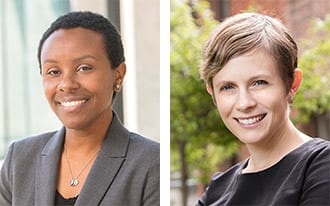
Rounding out the group of new faculty is none other than Chemerinsky himself, who will teach Constitutional Law during the spring semester. An iconic scholar of constitutional law, federal practice, and civil rights, he was named the most influential person in legal education in the U.S. earlier this year by National Jurist magazine.
“Berkeley Law is in the process of virtually unprecedented faculty hiring,” Chemerinsky said, noting that the school is also looking to hire as many as eight new faculty members to begin next academic year. “We have a terrific faculty and this allows us to greatly enhance it in every way.”
Indeed, the strength of Berkeley Law’s existing faculty was a major selling point for its new educators. Atkinson called her new colleagues “unmatched in their intellectual depth and range,” Badawi cited them as “a huge part” of what drew him to Berkeley, and Milligan said there is “no law school faculty I admire more.”
High-impact research
Professors are conducting significant research across the legal landscape, from Steven Davidoff Solomon on shareholder litigation to Andrea Roth on machine-based testimony, Alan Auerbach on tax reform to Christopher Edley, Jr. on education policy, and Lauren Edelman ’86 on workplace discrimination to Peter Menell on software litigation copyright issues. Of the 10 best corporate and securities law articles chosen by Corporate Practice Commentator in each of the past two years, Berkeley Law professors have written four of them.
The school’s research centers complement individual faculty scholarship with their own work. Three notable examples include:
- The Berkeley Center for Law and Business, which has cemented the school as a major thought leader across business law and finance. Over the past few years, the center’s Sustainable Business and Investment Forum, West Coast M&A Forum, and Corporate Law Conference have each emerged as go-to events for those engaged in the capital markets;
- The Berkeley Center for Law & Technology (BCLT), hub of the school’s No. 1-ranked intellectual property (IP) program and a national leader in patent, copyright, and trademark issues. Within the realm of privacy law, center faculty members have produced seminal reports on police surveillance technology, the impact of product design on consumer privacy, and key differences between U.S. and European norms;
- The Center for Law, Energy & the Environment (CLEE), which channels the law school community’s expertise into pragmatic, creative policy solutions. California has long been a national model for innovative reforms in climate change, ocean protection, groundwater markets, and land use—and CLEE plays a leading role in those reforms, working closely with policymakers in Sacramento.
Other arrows pointing up
Meanwhile, the school continues to be magnet for top students.
The academic profile of the incoming class improved from a year ago, as did its geographic diversity. There were 2,251 applicants with LSAT scores above 165—an increase of 42 percent over the prior year.
Applications are up by 2 percent for the second consecutive year, in contrast with a national law school application decrease of 2 percent from last year.
On the fundraising side, Berkeley Law enjoyed its best year in the past decade, 9 percent higher than the year before.
IP prowess
Berkeley Law boasts the nation’s top-ranked IP law program—and has for 18 of the past 20 years. The school published the country’s first IP law journal, established the first IP-focused multidisciplinary research center of its kind, and continues to build crucial connections with Silicon Valley that benefit its students in many ways.
There is no resting on laurels, however. In November, Berkeley Law will launch its Asia IP Project. This initiative will enhance existing and new collaborative relationships with academic institutions and others in Asia, produce research and writing on key IP issues, and coordinate workshops, symposia, and other events.
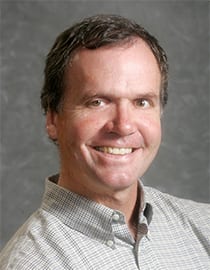
The program will be led by Mark Cohen, senior counsel to the U.S. Patent and Trademark Office, who heads the office’s China team and assists multiple government agencies on China IP-related matters. Cohen has designed and implemented several new approaches to engagement on such issues, taught the first class on Chinese IP law in a North American law school, and organized conferences in the U.S. and China.
“IP and privacy/data security are both inherently transnational fields now,” said Professor and BCLT Co-director Robert Merges. “We feel we must take a leadership position in trans-Pacific legal practice in these fields, and this initiative positions us to do just that. We will have conferences, programs, visiting scholars, and more on the ground in Beijing and Shenzhen. And we will grow from there.”
Merges noted that in addition to the school’s partnership with Renmin University, “we will be deepening programs with Peking University, the PKU Transnational Law School in Shenzhen, as well as leading law firms and companies in China.”
Business boon
Business is also booming, especially with the additions of Badawi, Partnoy, and Atkinson. The school offers more than 30 unique business law classes—taught by an energetic group of leading business law scholars and practitioners—on topics such as venture capital, mergers and acquisitions, private equity, and financial regulation.
The fast-growing Startup@BerkeleyLaw program, launched in 2015, provides students with innovative programming and practical opportunities assisting early-stage companies. Its unique Form & Fund workshop series has trained hundreds of campus entrepreneurs on key legal, financial, and operational issues; its new Access to Entrepreneurship program brings this training to underrepresented founders nationwide; and its successful Venture Capital Deal Camp provides worldwide programming for investors interested in expanding into venture capital financing.
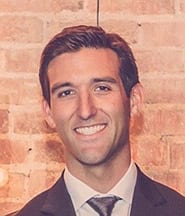
“We have no hesitation in saying that our business law program is the most innovative and dynamic in the entire country,” said Professor Robert Bartlett, who co-directs Startup@BerkeleyLaw. “No other law school has seen this much growth within their business law faculty, and we anticipate even more hiring in the future.”
Ben Toussant ’18 appreciates that students gain “unparalleled access to business leaders and entrepreneurs who are quite literally changing the world … Students can partner with Bay Area incubators to provide full-service pro bono legal representation to startups under the supervision of a licensed attorney. Truly, there’s no better place to launch a legal career with a business focus.”
Public mission, public service
A longtime leader among law schools in civic engagement, Berkeley Law upholds its public mission in myriad ways. Professor and Death Penalty Clinic Director Elisabeth Semel, a faculty member since 2001, has seen the school’s public interest landscape grow exponentially.
“The range of hands-on pro bono opportunities for 1Ls is almost staggering, and demonstrative of our students’ initiative, faculty and staff who nurture their creativity and commitment, and lawyers in the community who provide indispensable supervision,” she said.
Adding the Environmental Law Clinic (ELC) and the Policy Advocacy Clinic (PAC) in 2015 greatly expanded an already rich offering of social justice outlets. The Thelton E. Henderson Center for Social Justice has broadened its programming under Director Savala Trepczynski ’11, and the school’s Student-Initiated Legal Services Projects—30 of them, open to all students—fuel lawyering and leadership skills through pro bono projects that involve direct client service, legal research, and educational outreach.
“Berkeley Law offers amazing support for students’ social justice and civil rights work,” said Isaiah Williams ’18. “There’s no shortage of organizations to get involved in, and if the type of organization you want to join does not exist, the school will make sure you have the support to create it.”
Chemerinsky’s arrival only enriches that environment. Semel noted his “career-long involvement in public interest law demonstrated through his prominence as a constitutional law scholar, his deanship at UC Irvine, and his advocacy in numerous cases on behalf of individuals and groups whose fundamental civil liberties were in jeopardy. Indeed, the dean’s professional accomplishments serve as a model for our many students who are public-service minded.”
Community ally
Student opportunities routinely translate into meaningful change for disadvantaged area individuals and communities. A few recent highlights:
- A major PAC report prompted several California counties to eliminate or reduce draconian juvenile justice fees that disproportionately affect families of color. Cited by The New York Times and U.S. Justice Department in urging reform, that work led to a major grant positioning PAC to spearhead the effort to rescind such fees nationwide. The clinic also helped develop Senate Bill 190, which would end these fees in California, and could be signed this month by Gov. Jerry Brown. Berkeley Law will host a major national convening on the issue in February 2018.
- ELC won a final legal ruling that forced the California Department of Public Health to release guidelines on the risks of cell phone radiation and ways to mitigate exposure. The agency had analyzed the scientific data, but suppressed its own findings. After several failed Public Records Act requests, a suit was filed with ELC Director Claudia Polsky ’96 serving as the victorious lead counsel.
- A unique collaboration between Berkeley Law education advocates and local public defenders is providing hope—and stability—for vulnerable youth. Students and lawyers at the East Bay Community Law Center identify clients’ complex educational needs that schools often fail to address, consult with teachers and administrators, and appear in court. In doing so, they are redefining youth advocacy while keeping young people in school and out of the juvenile justice system.
Berkeley Law’s public mission involves not only producing a diverse class of students—its new 1L class is 42 percent people of color—but supporting them once they enroll and after they graduate.
Just one example: 11 African-American students and alumni were chosen for coveted federal judicial clerkships in the recent hiring cycle, the highest number in school history.
It is a stunning figure given the jarring lack of racial diversity within America’s judicial chambers. The last time comprehensive figures were made available by the National Association for Law Placement, African Americans secured only 36 of 1,168 federal clerkships nationwide awarded to 2009 law school graduates.
Meanwhile, Berkeley Law’s First Generation Professionals Group is one of the school’s fastest-growing student organizations. The Career Development Office works closely with the group to provide networking opportunities, mentoring, and support to ease the law school transition for those who are the first in their family to attend college.
“It’s imperative that Berkeley Law remains accessible to the best and brightest from all backgrounds,” Chemerinsky said. “That’s a critical part of our mission as a public university law school, and it is part of why we’re positioned to achieve greater heights in the years ahead.”